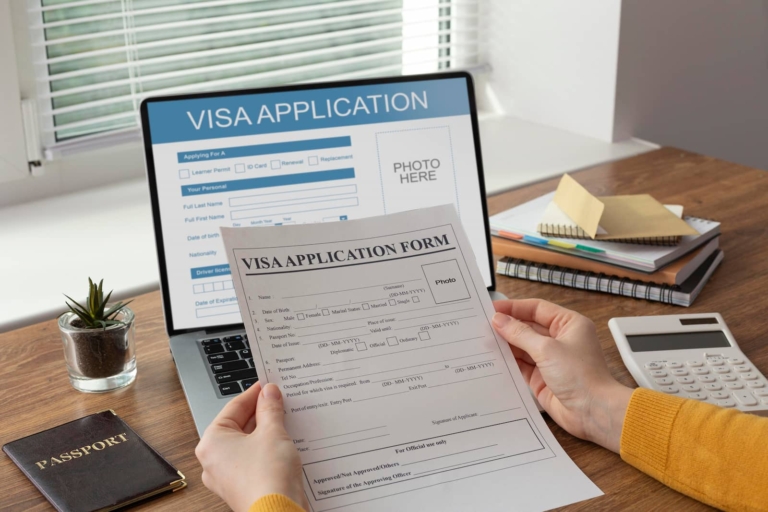Retiring in Thailand offers a unique blend of cultural richness, tropical beauty, and an affordable lifestyle. The Thailand Retirement Visa is designed to attract retirees from around the world, providing them with a long-term stay option. This guide delves into the specifics of the retirement visa, helping you understand the eligibility criteria, application process, and benefits of retiring in this Southeast Asian paradise.
Eligibility Criteria for Thailand Retirement Visa
Age Requirements
Applicants must be 50 years or older to qualify for the retirement visa. This age criterion ensures that the visa is issued to those genuinely seeking retirement and is not intended for individuals looking to work or study in Thailand.
Financial Requirements
Financial stability is crucial. Applicants need to show either:
- A bank deposit of at least 800,000 THB in a Thai bank account for at least two months before applying.
- A monthly income or pension of at least 65,000 THB.
- A combination of bank deposit and annual income totaling at least 800,000 THB.
In case of the bank deposit requirement, applicants will need to provide an updated Thai bank book or passbook and a bank letter confirming that the funds were deposited from an overseas source. For the monthly income requirement, a letter from the applicant’s embassy verifying the income may be necessary. If the embassy does not issue such a letter, a 12-month bank statement showing regular deposits of 65,000 THB will be accepted.
Health Requirements
Certain health conditions must be verified before obtaining a retirement visa. A medical certificate is required to confirm that the applicant is free from the following diseases:
- Leprosy
- Tuberculosis
- Drug addiction
- Elephantiasis
- Syphilis
Health Insurance: While not always a requirement, some Thai embassies or consulates abroad may require annual health insurance for applicants seeking a retirement visa, especially under the O-A or O-X visa categories.
Police Clearance Certificate
Applicants must provide a police clearance certificate from their home country, issued within three months of the visa application. The document needs to be notarized and is an essential part of the application, especially when applying from abroad.
Types of Retirement Visas
Non-Immigrant O Visa
This visa allows individuals to stay in Thailand for up to one year. It is suitable for retirees or those not intending to work and can be extended within Thailand for continued stays.
Non-Immigrant O-A Visa
Specifically designed for retirees, the O-A visa permits an initial stay of up to one year. It can be applied for in the applicant’s home country and is typically accompanied by stricter health insurance requirements.
Non-Immigrant O-X Visa
The O-X visa allows long-term retirees to stay in Thailand for up to 10 years. It is only available to nationals from certain countries and includes a more stringent set of requirements but offers greater stability for those looking for long-term residence.
Application Process for the Retirement Visa
Steps to Apply in Home Country
For those applying from abroad, the process typically involves:
- Gathering Documents: These include the passport, recent photographs, financial proof, police clearance, and medical certificates.
- Submission at Thai Embassy/Consulate: Applicants must submit the application and required documents to their nearest Thai embassy or consulate.
- Fee Payment: The visa fee ranges from 2,000 THB for a single-entry visa to 5,000 THB for a multiple-entry visa.
- Approval Time: Processing times vary but typically take a few weeks.
Steps to Apply in Thailand
Applicants already in Thailand can convert their visa, usually starting with a tourist visa or a 90-day Non-Immigrant O visa:
- Enter Thailand on a Tourist Visa: This visa can be converted to a Non-Immigrant O visa in-country.
- Document Submission: Required documents, including proof of financial stability and medical certificates, must be submitted to the local immigration office.
- Application at Immigration Office: The retirement visa application can be filed once the 60-day period has passed or during the final 30 days of the current visa validity.
Visa Validity and Extensions
The retirement visa is initially valid for one year. However, it can be renewed annually within Thailand. For renewal:
- Applicants must submit a TM.7 form (extension application form) along with financial proof similar to the initial application.
- The required 800,000 THB deposit must be maintained in the applicant’s Thai bank account for at least three months prior to renewal, compared to two months during the first application.
90-Day Reporting
Retirees must report their current residential address to immigration authorities every 90 days. This can be done in-person at the local immigration office, online, or by mail. An authorized agent can also handle this task on behalf of the retiree using a Power of Attorney.
Re-Entry Permits
To travel outside Thailand without invalidating the retirement visa, retirees must apply for a re-entry permit. There are two types:
- Single Entry: Allows one exit and re-entry, costing 1,000 THB.
- Multiple Entry: Allows unlimited exits and re-entries during the visa’s validity, costing 3,800 THB.
Permits can be obtained at immigration offices or international airports in Thailand. Failure to obtain a re-entry permit before leaving Thailand will result in the retirement visa being canceled.
Spousal Visas
Spouses under 50 years old can apply for a Non-Immigrant O Visa, but their stay is typically limited to three months, requiring periodic renewals. For spouses meeting the retirement age requirement, they can apply for their own retirement visa.
Retirement Visa Benefits
Thailand offers many advantages to retirees:
- Lower cost of living and affordable healthcare.
- Access to world-class healthcare facilities.
- Active expat communities that provide social networks and recreational activities.
- The country’s natural beauty, from beaches to mountains, provides ample opportunities for leisure and exploration.
However, it is important to note that retirees cannot import personal effects duty-free into Thailand.
Alternatives to the Thailand Retirement Visa
- LTR Visa (Long-Term Resident): This visa offers a 10-year renewable visa with the benefit of annual reporting instead of 90-day reporting. It’s a great option for those looking for a hassle-free long-term stay.
- Thailand Elite Visa: A membership-based visa providing luxurious perks like healthcare benefits, spa treatments, and fast-track services at airports. Visa holders can stay for 5 to 20 years depending on the package chosen, making it a favored option for affluent retirees.
Activities for Retirees
Retirees in Thailand can enjoy an array of activities, such as:
Popular Hobbies
Thailand offers a wide range of activities for retirees, from golfing and tennis to yoga and meditation. The country’s natural beauty also provides opportunities for hiking, bird watching, and photography.
Social Clubs
Joining social clubs can be a great way to meet new people and engage in various activities. Many cities have clubs focused on different interests, including book clubs, dining groups, and sports clubs.
Volunteering Opportunities
Volunteering is a rewarding way to give back to the community. There are numerous opportunities in Thailand, such as teaching English, working with nonprofits, and supporting environmental conservation projects.
Traveling Within Thailand
Popular Destinations
Thailand is home to many stunning destinations, from the bustling streets of Bangkok to the tranquil beaches of Phuket and the cultural riches of Chiang Mai. Each region offers unique experiences and attractions.
Transportation Options
Thailand’s transportation network is extensive, with options including domestic flights, trains, buses, and ferries. Domestic airlines like Thai Airways and Bangkok Airways offer flights between major cities and tourist destinations. The train system, operated by the State Railway of Thailand, provides scenic routes across the country. Buses and mini buses are widely available for regional travel, while ferries connect the islands.
Travel Tips
- Book in Advance: Especially during peak travel seasons, book your transportation and accommodations early.
- Stay Safe: Keep an eye on your belongings and be cautious in crowded areas.
- Enjoy Local Cuisine: Don’t miss out on Thailand’s delicious street food and local specialties.
Recent Legal Developments
The Thai government is making significant changes to laws regarding foreign ownership of property. The Interior Ministry, as directed by the Cabinet, is set to amend the Condominium Act to increase the foreign ownership limit in condominium developments from 49% to 75%. Additionally, the Land Act is being revised to extend the lease period for foreigners from 50 years to 99 years. These changes aim to attract more foreign investment and make Thailand an even more appealing destination for retirees and expatriates.
FAQs
Q1. What are the age requirements for a retirement visa in Thailand?
Applicants must be 50 years or older to qualify for the retirement visa.
Q2. What financial proof is needed for the retirement visa?
Applicants need to show a bank deposit of at least 800,000 THB, a monthly income of 65,000 THB, or a combination of both totaling at least 800,000 THB annually.
Q3. How often must I report my address to Thai authorities?
Every 90 days, visa holders must report their current address to immigration authorities.
Q4. Can I travel outside Thailand with a retirement visa?
Yes, but you need a re-entry permit to ensure your visa remains valid upon return.
Q5. What health requirements must be met for the retirement visa?
Applicants must provide a medical certificate confirming the absence of leprosy, tuberculosis, drug addiction, elephantiasis, and syphilis.
Q6. What recent changes have been made to property laws for foreigners in Thailand?
The Cabinet has directed the Interior Ministry to amend the Condominium Act to increase the foreign ownership limit to 75% and the Land Act to allow 99-year leases for foreigners.
Conclusion
Retiring in Thailand offers a rich cultural experience, affordable living, and numerous benefits for expatriates. With comprehensive healthcare, a welcoming expat community, and recent legal developments favoring foreign property ownership, Thailand stands out as a top retirement destination. For those looking to enjoy their golden years in a beautiful and vibrant country, Thailand’s retirement visa presents a compelling option.
Enhance your retirement experience by investing in a luxury villa in Koh Samui with Horizon Homes, where stunning properties meet unparalleled comfort and elegance.







